Archived Articles
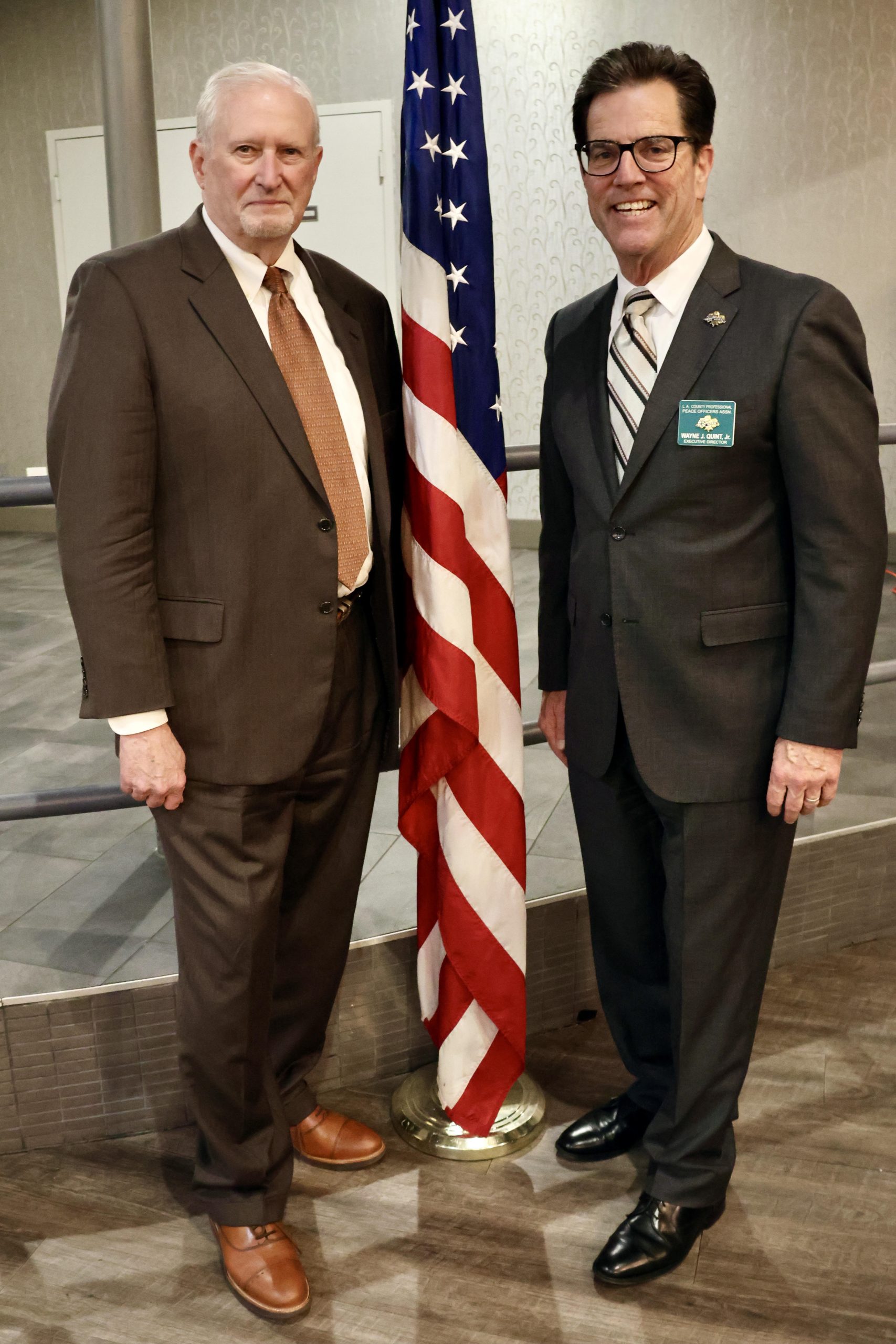
Ron and PPOA Executive Director Wayne Quit
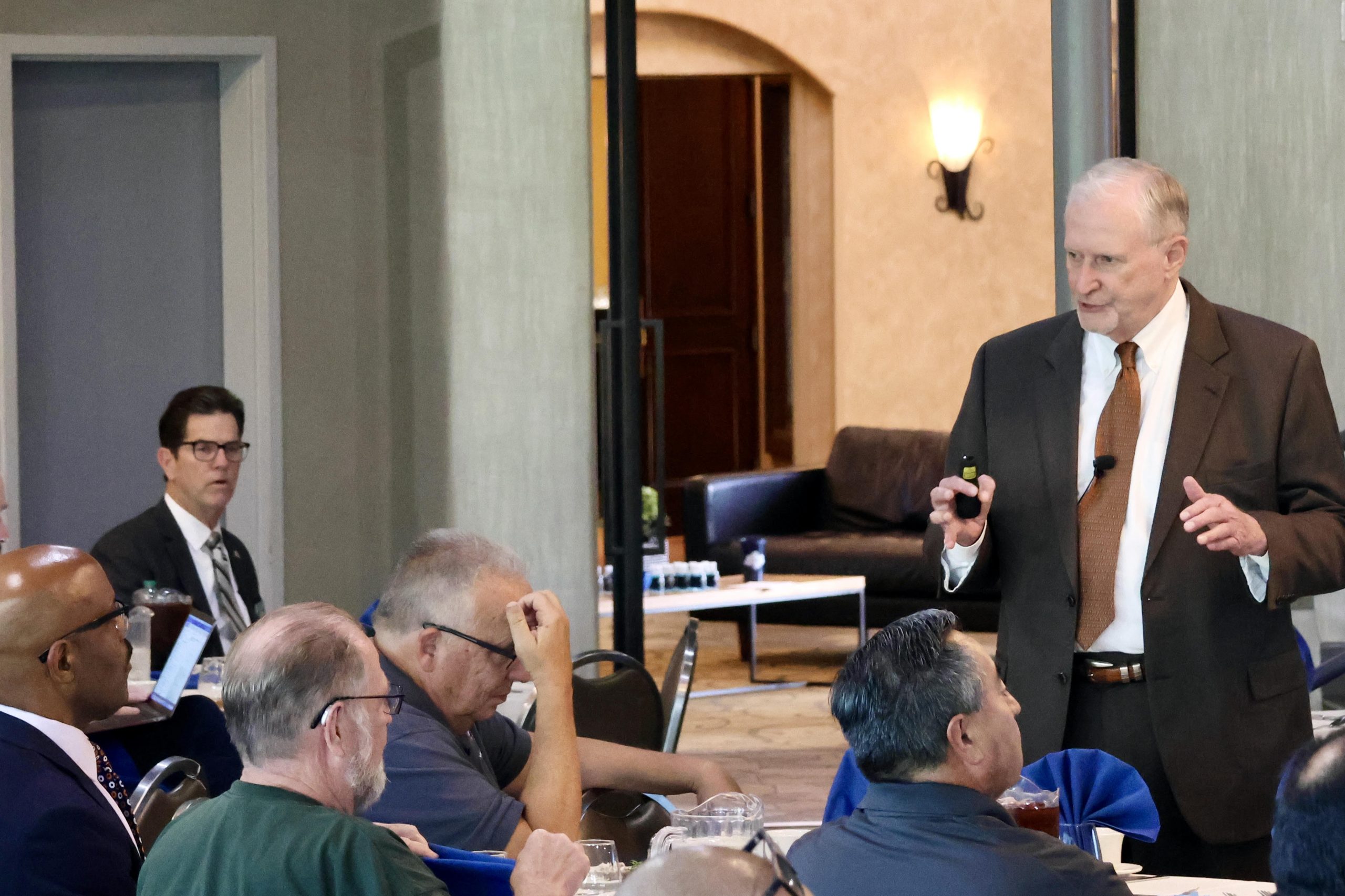
Speaking to PPOA delegates
I was invited to speak to a delegates meeting for the Los Angeles County Professional Police Officers Association (PPOA) in Alhambra. PPOA represents 5,000+ members in five bargaining units covering LASD lieutenants and sergeants, security officers, custodial assistants, dispatchers, other civilian employees and ME investigators. Executive Director Wayne Quint wanted me to discuss Police Unions and the Reform Movement. LA County has one of the most progressive district attorney’s in the nation. Reform activists have passed three initiates since 2020. These union members are facing tremendous external pressures. You can read my latest book but the simple answer is Police Unions have not had a message that would resonate with the public and the reform activists have. It is not a factual debate because 100% of the reform initiatives have nothing to do with creating a better officer. The reform movement is not about reform – it is about accumulating power, gaining access to more tax dollars and lessening the influence of the police unions.
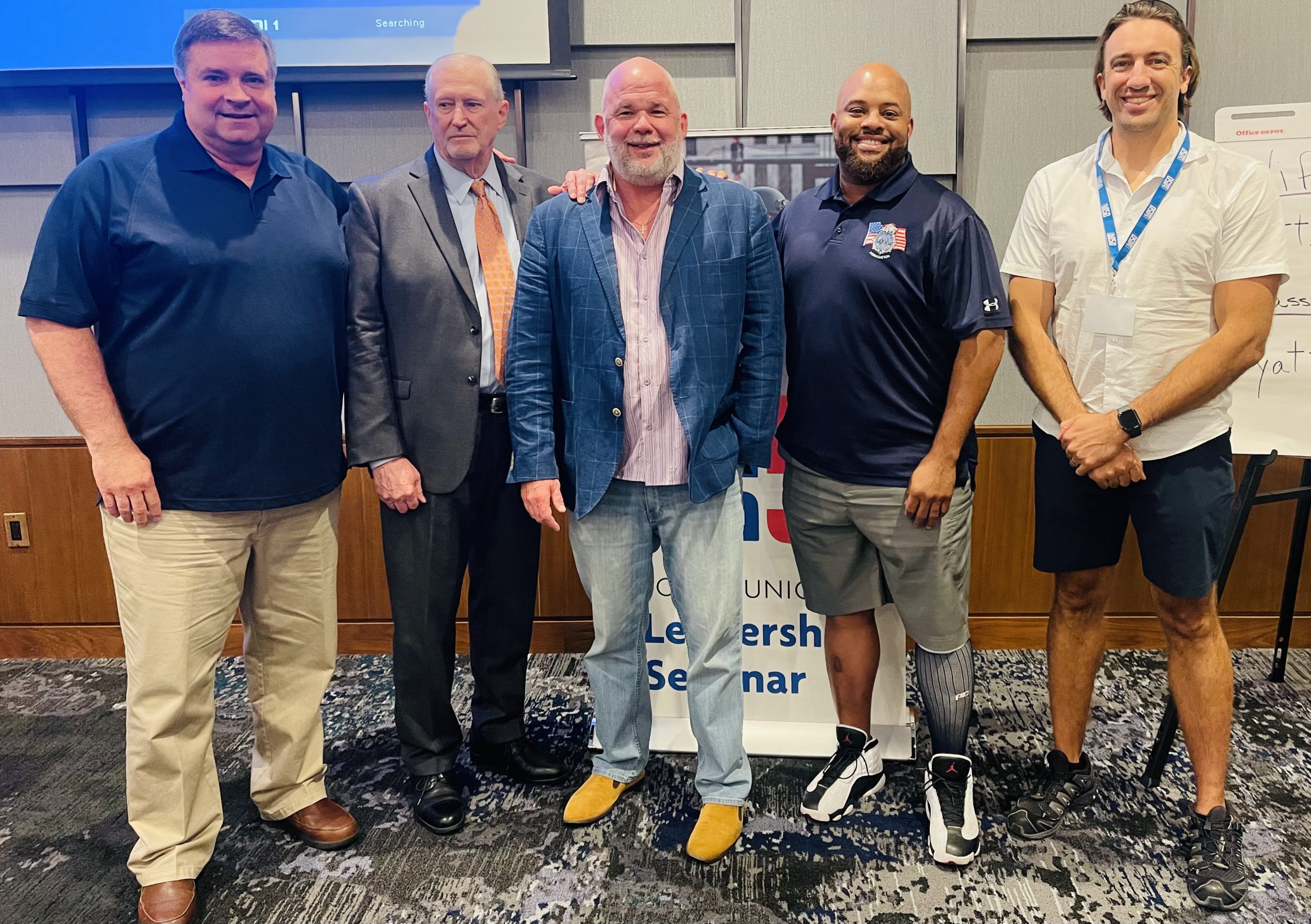
Brian Marvel (President PORAC), me, Randle Meadows (retired Arlington Tx now political consultant), Anthony Conner (President Omaha POA), and Michael Endres (Austin police officer & social media consultant).
I was honored to be a keynote speaker at the 2023 Big 50 Police Union Executive Leadership conference at Fort Lauderdale. Thanks to John Rivera for the invitation. Pictured above are four contributing authors to my book Police Unions and Police Reform.
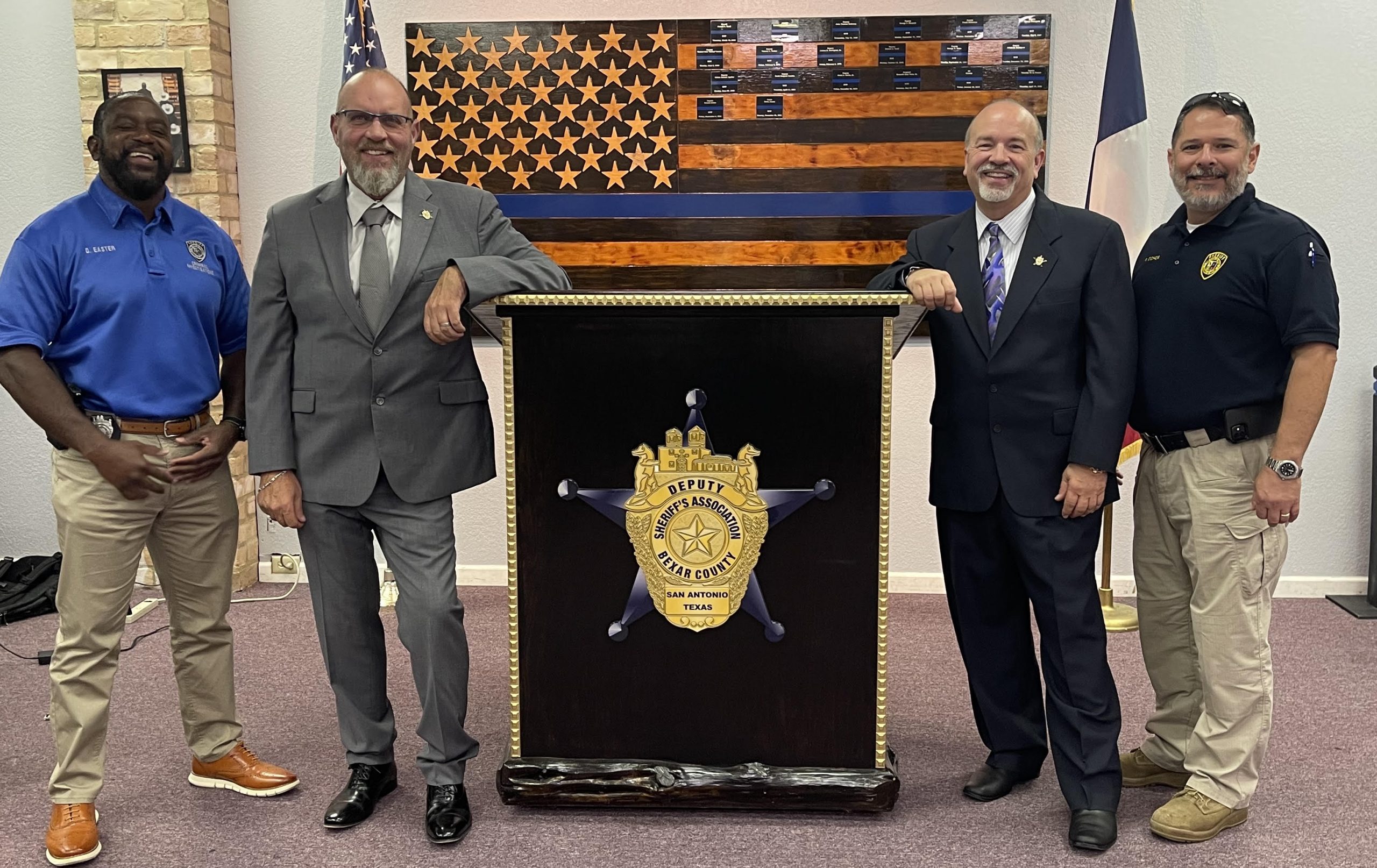
DSABC, Bexar County and Sheriff sign an historic new wage agreement.
I appreciated the opportunity to serve as the Chief Negotiator for the Deputy Sheriff’s Association of Bexar County (DSABC) on their contract negotiations two years ago and again during this reopener. In the current 4-year contract the County and Union agreed to reopen the contract after the County conducted a market-based wage study. After several meetings starting in April the County and Union agreed to start the new wage table and steps mid-contract.
On Tuesday, August 1, 2023, Bexar County Commissioners Court approved a historic agreement with the Deputy Sheriff’s Association of Bexar County and the Bexar County Sheriff’s Office. The agreement will adjust deputies’ salaries to match fair market levels and will provide the BCSO greater flexibility in its recruitment of patrol officers.
“We applaud this adjustment to our collective bargaining agreement, because it will enable higher recruitment and better retention of deputy sheriffs,” says Ronald Tooke, President of the Deputy Sheriff’s Association of Bexar County. “For far too long, we’ve been short several hundreds of deputies in the jail and on patrol. Our deputies are constantly forced to work extra shifts. This agreement is a step in the right direction.”
The new fair market value salaries will make BCSO positions competitive with those of other Texas law enforcement agencies. The Deputy Sheriff’s union has long pointed to insufficient wages as a hurdle to recruitment and retention. In its 2022 study, Detain, Inc., an independent consultant, found that BCSO deputies were the lowest paid in the State’s six major metropolitan counties, with entry-level pay 15.9% and maximum pay 39.6% below the average. Even surrounding rural counties, such as Kendall, Atascosa, Guadalupe, and Comal, all offered higher entry-wages.
The second component of the agreement, the so-called ‘straight to the streets’ program, will allow the BCSO to hire qualified patrol officers without requiring them to first serve as detention officers in the Bexar County Adult Corrections Facility. Until now, anyone seeking employment as a patrol officer has had to first serve as a detention officer. In parallel, the agreement also enables employed detention officers without possession of a peace officer license to apply directly to patrol positions and receive preference points over non-detention applicants. Currently detention officers, who often work nearly 80 hours a week, are unable to go to school to obtain such licenses due to work restrictions. All patrol applicants will still be required to attend the patrol academy.
Your content goes here. Edit or remove this text inline or in the module Content settings. You can also style every aspect of this content in the module Design settings and even apply custom CSS to this text in the module Advanced settings.
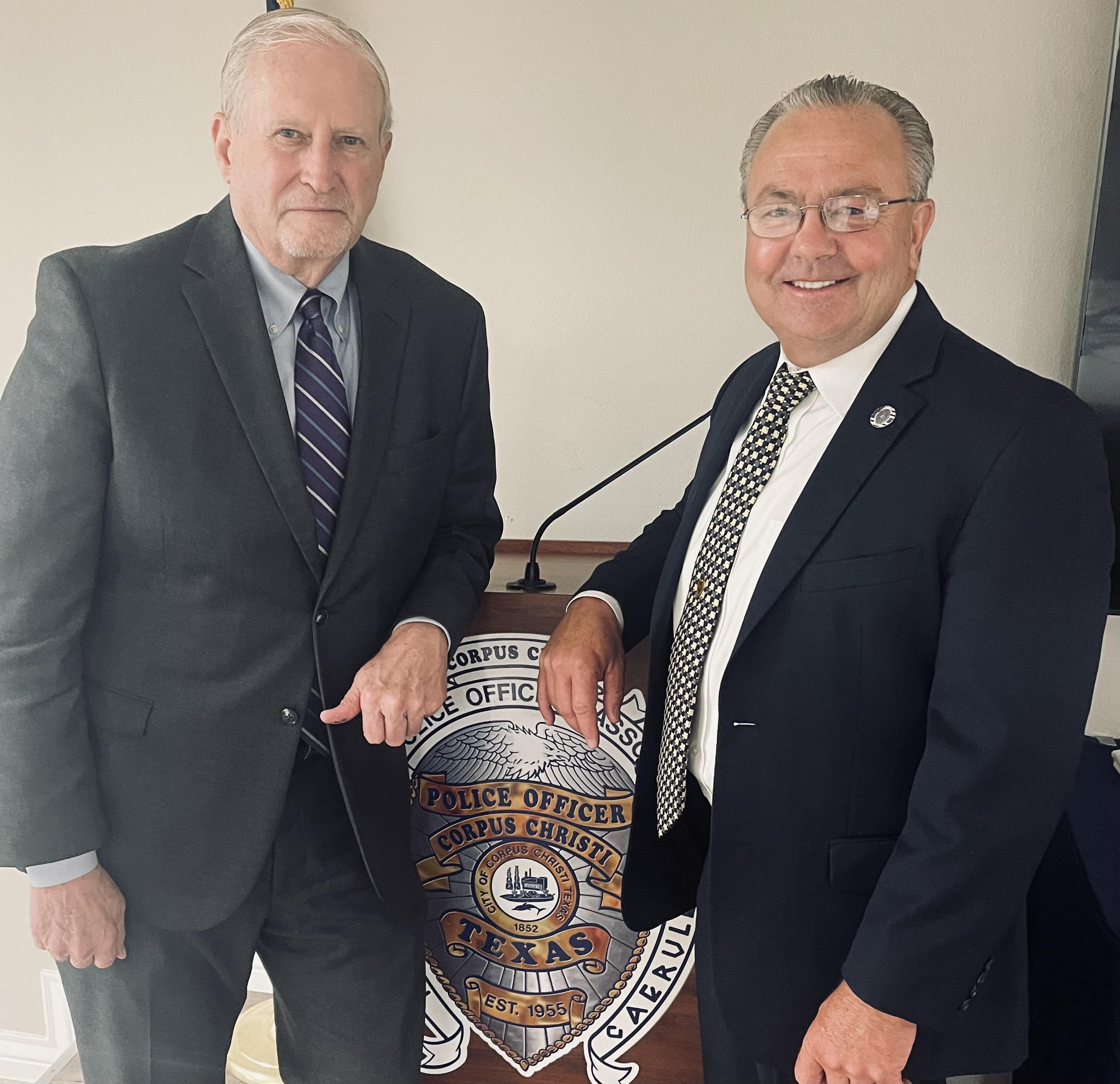
Left to Right: Ron DeLord and CCPOA President Scott Leeton
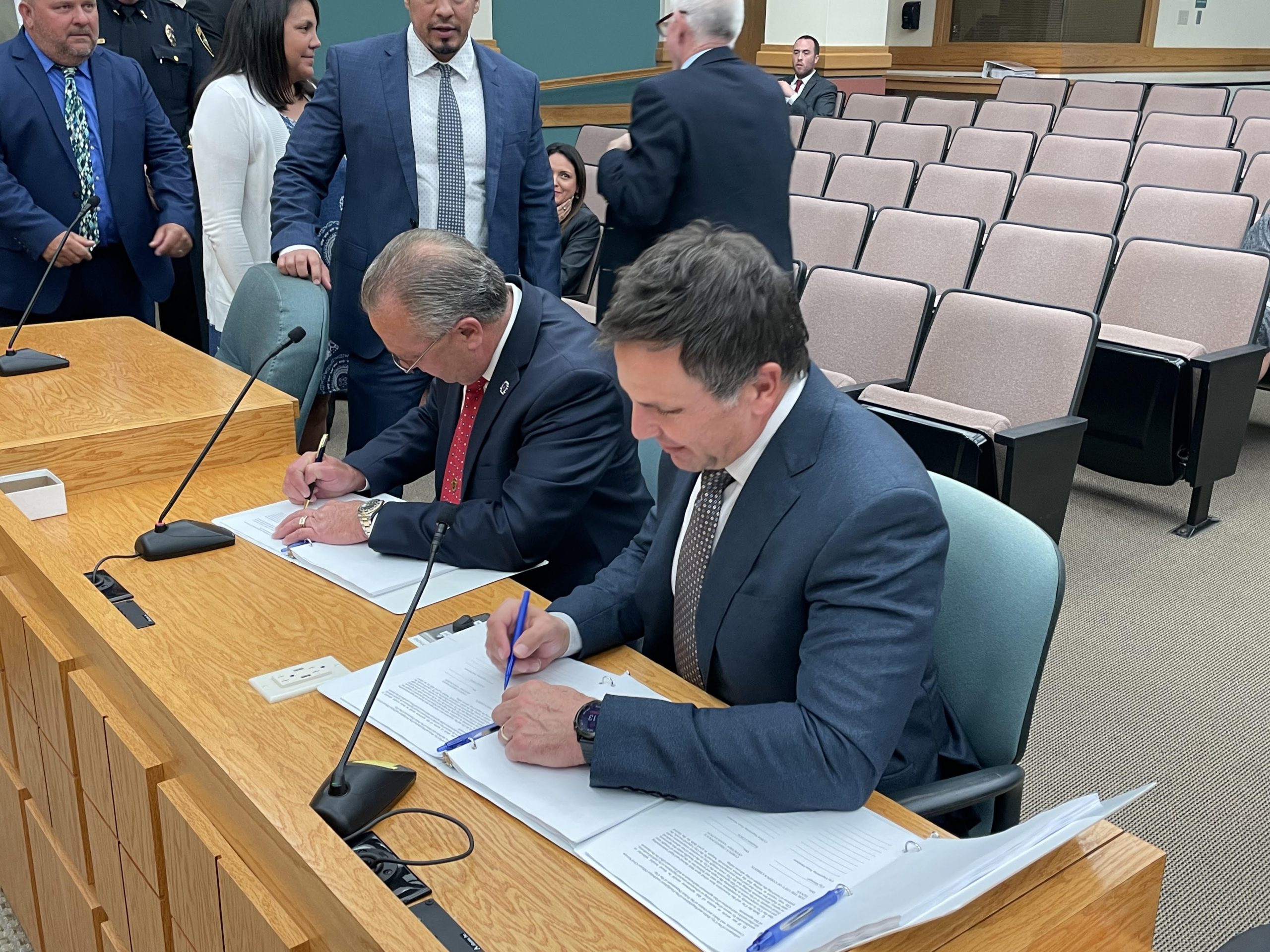
Left to Right CCPOA President Scott Leeton and Corpus Christi City Manager Peter Zanoni sign new 4-year agreement
I appreciated the opportunity to be the chief negotiator for the Corpus Christi Police Officers Association. The union and city started negotiations on May 4 and reached a deal on a new 4-year contract in 34 days. CCPOA members voted 95% to accept the deal and the City Council ratified by a unanimous vote.
Effective Year 1: 8%
Effective Year 2: 3%
Effective Year 3: 3%
Effective Year 4: 4%
All officers will receive a $2,000 cash bonus on October 1, 2024. The total value for the contract for the department’s 500 officers is $29.3 million.
Congratulations to the CCPOA and the City for proving that collective bargaining works best for building and retaining a professional police department.
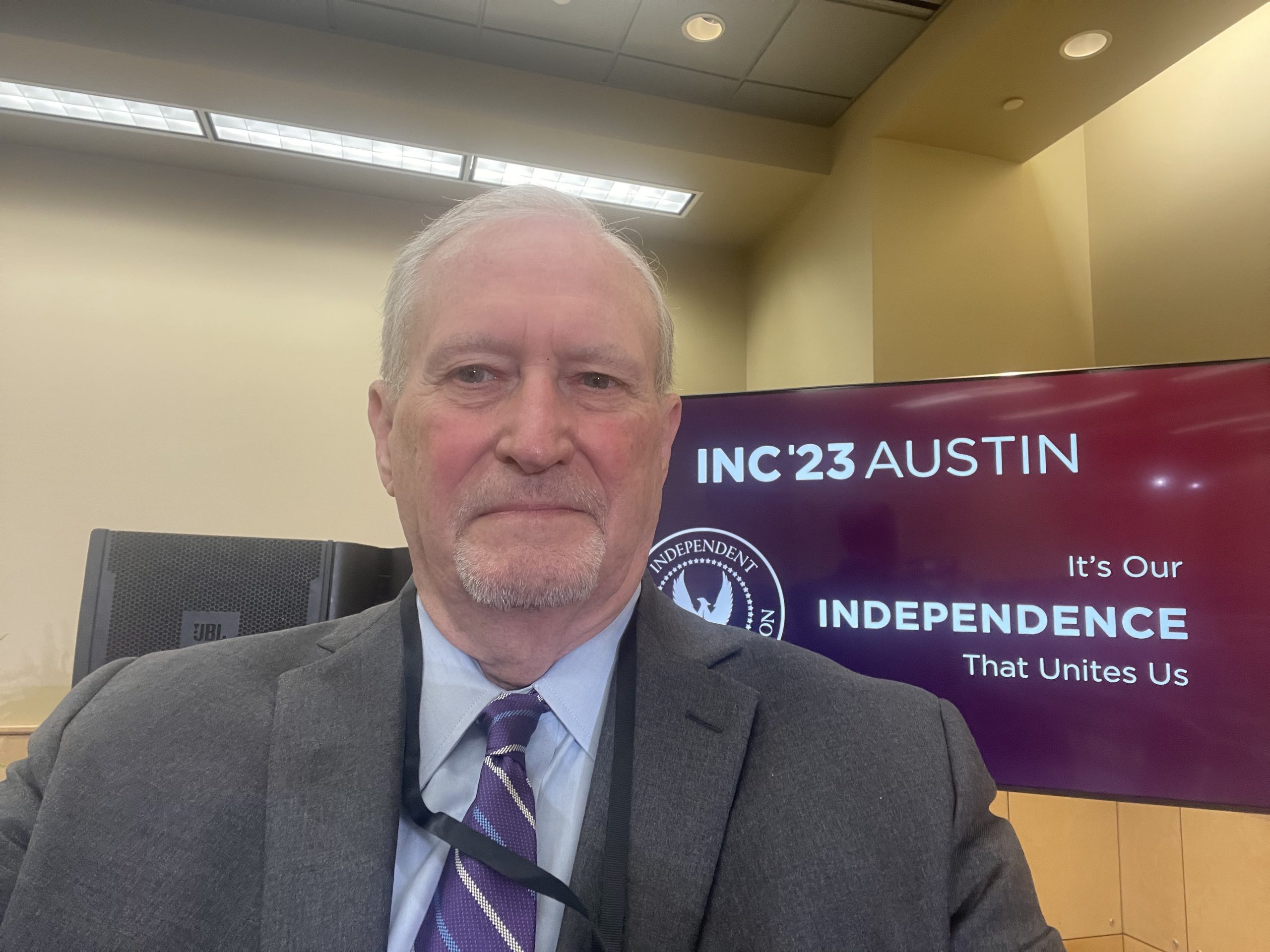
I appreciated the opportunity to be a panelist with retired Austin officer Dennis Farris on police reform at the 2nd annual Independent National Convention at Palmer Event Center at Austin.
Ron is quoted in the following article on Reuters.com.
Police back Republican candidates in U.S. midterms, even those at Jan. 6 riot

Beaumont POA and the City reach a new 4-year contract. The membership ratified the contract by an 80% margin and City Council ratified by a unanimous vote.
Some of the highlights of the new contract include:
A Compressed Pay Scale – It previously took 20 years to earn top officer pay; that’s been reduced to 10 years.
Lateral Entry Hiring – A new program designed to transfer years of service credit from other departments to ensure new officers are properly compensated when bringing on-the-job experience from other cities.
Beaumont POA and the City reach a new 4-year contract. The membership ratified the contract by an 80% margin and City Council ratified by a unanimous vote.
Some of the highlights of the new contract include:
A Compressed Pay Scale – It previously took 20 years to earn top officer pay; that’s been reduced to 10 years.
Lateral Entry Hiring – A new program designed to transfer years of service credit from other departments to ensure new officers are properly compensated when bringing on-the-job experience from other cities.
Additional Incentives – An increased stipend for body armor, two additional holidays, and a $2,000/year bonus for already certified officers up to five years.
“I spent months analyzing what it would take to attract top talent to Beaumont and get our exceptional officers to stay in Beaumont, said Beaumont Police Officers Association President Robert Campbell. “We’re very pleased with the new contract and believe we’re now able to be more competitive with cities of our size and caliber and look forward to our continued work to protect and serve the citizens.”
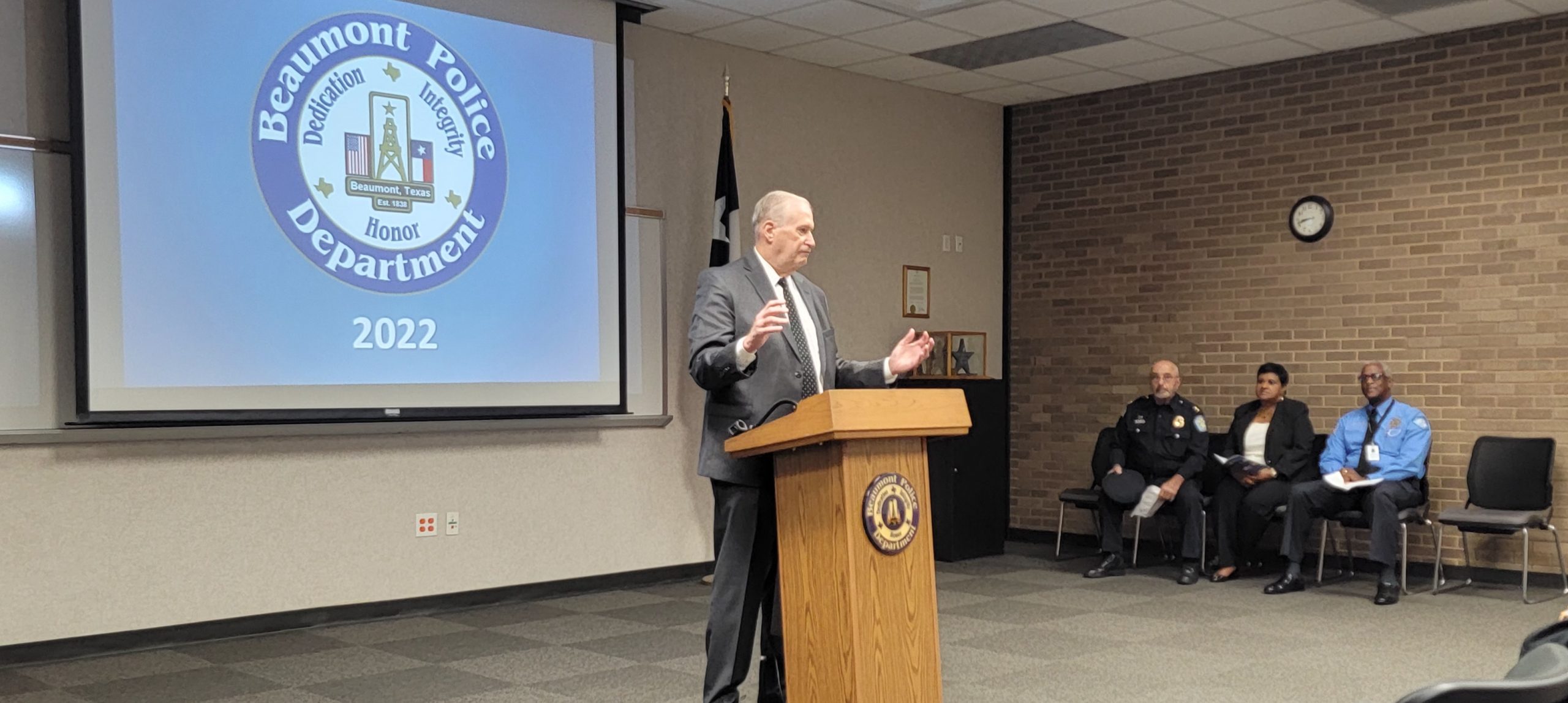
On September 15, 2022 the Beaumont Police Department held a special memorial service to add two recently discovered officers who died in the line of duty. I appreciated the opportunity to be the keynote speaker at the service and a researcher on the cases. In 1902 Officer George Frederick was off duty when he heard gun shots. Two sisters were arguing and one shot the other. Officer Frederick intervened and was fatally wounded by the woman. He returned fire killing her. He was the first known black officer at BPD to die in the line of duty. In 1917 Motorcycle Officer James A. Gaines was pursuing a stolen vehicle on his police motorcycle when he hit a curb and died the next day.
The One Group That Could Make a Difference on Gun Control
The polarization of policing has made it politically difficult for firearm restrictions to pass. By Adam Serwer
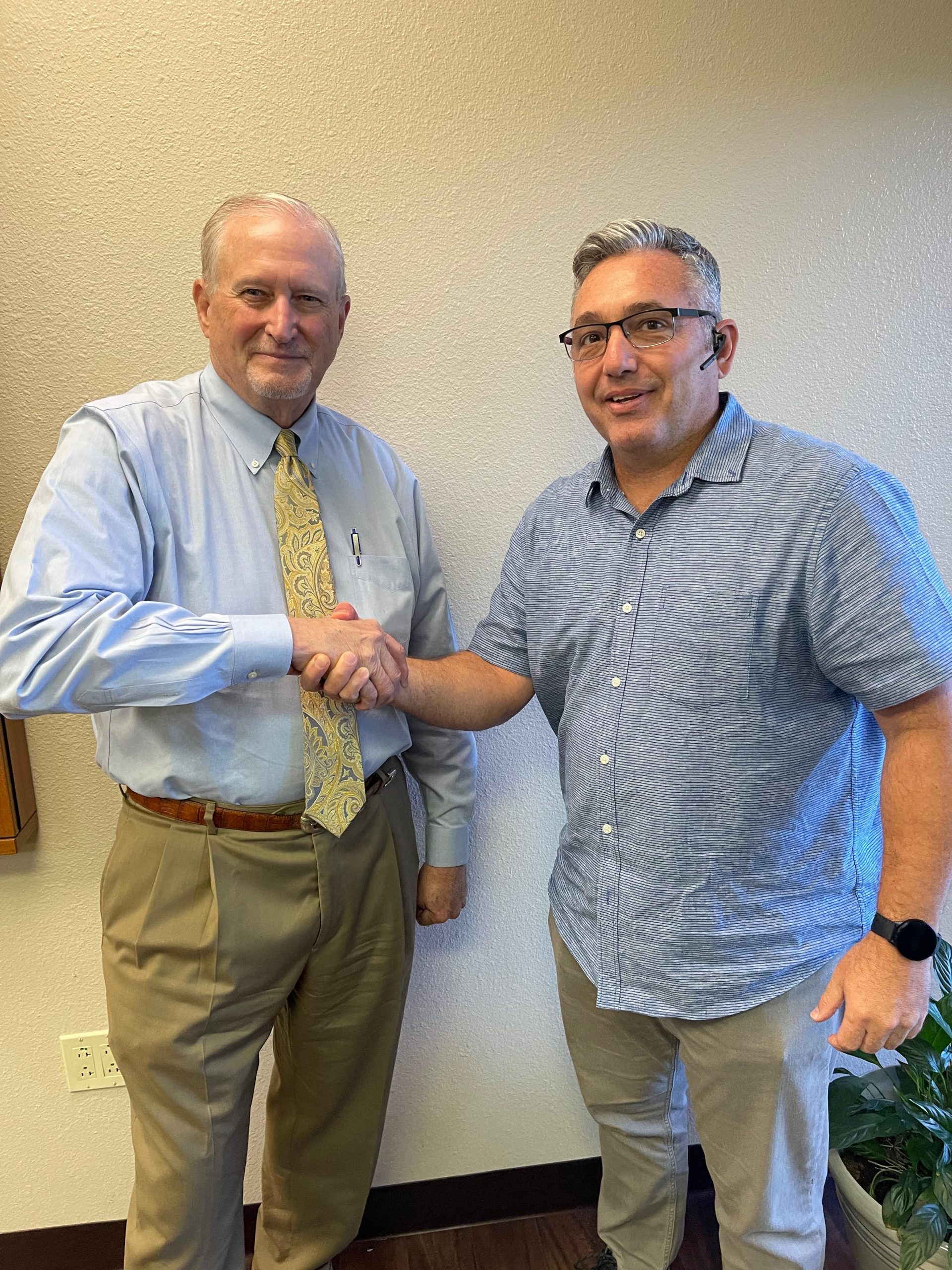
Congratulating SAPD Sergeant Chris Lutton, chair of the union bargaining team
I appreciated the opportunity to be the chief negotiator for the 2,370 member San Antonio Police Officers Association for another round of contract negotiations. I had been chief negotiator for the prior negotiations that had been turbulent and dragged on 3-years and ended in federal court mandated mediation. The fight in those negotiations was over paying premiums for health care.
The current agreement expired on September 30, 2021, but there is an 8-year evergreen clause. The death of George Floyd in May 2020 had sparked demonstrations nationwide, including San Antonio. Storm clouds were brewing over the city demanding concessions on discipline when the city and union started negotiations on new contract in February 2021. SAPOA’s longtime president had retired and a new president, Danny Diaz, was elected. Reform activists had circulated a petition to repeal Chapter 174 which granted officers collective bargaining. The election was set for May 1st. The state law requires the parties to negotiate in good faith for at least 60-days before declaring impasse, but the deadline can be extended by mutual agreement.
Needless to say the negotiations were tense with widespread media coverage supporting the city and reform activists demands. At the end of 60-days the parties had not reached an agreement and agreed to extend until after the repeal election. On May 1st 150,000 people voted and the repeal measure was defeated 49% to 51%. This narrow victory by the union allowed the city and union to return to the table. On March 2, 2022 the parties reached a tentative agreement. SAPOA members ratified the new agreement by a. Margin of 86%, and the city council voted 8-3 to ratify on May 12.
The new contract did enhance some disciplinary measures. The scope of the arbitrator was defined and now articulates what the chief must prove and what the arbitrator must consider to uphold discipline. The 48-hour notice to give a statement was reduced to 24-hours. The bifurcated 180-day statute of limitations for the chief to file misconduct charges (180-days from occurrence for non-criminal related and 180-days from discovery for criminal related) was changed to one 180-day rule. The new statute of limitations is 180-days from discovery with a 24 month maximum unless the officer is charged with a crime. Prior sustained misconduct may be included in the disciplinary charge if the chief cites it in the original charge.
In re compensation officers will receive a 2% lump sum bonus upon ratification. In fiscal years 2023 and 2024 officers will receive 3.5% each year and in fiscal years officers will receive 4% each year. The city reported SAPD would be the second highest paid department only behind Austin.
The contract also added a new family leave benefit of up to 160 hours, or four weeks, of paid leave after birth, fostering or adoption of a child, This is the first in Texas. Despite protests from reform activists the new contract did not change the existing civilian review board.
Thanks to SAPOA President Danny Diaz, bargaining chair Chris Lutton, SAPOA Treasurer Jason Sanchez, and team members Rachel Barnes, Cynthia Lindley, Sandra McCormick, Troy Ragland, Cliff Burns, Jesse Soleto and Daniel Ramiriez.
My interview on Minneapolis Public Radio on police union contracts and disciple
I appreciated the opportunity to be the chief negotiator for the Webb County Deputy Sheriffs Association. It was an unusual bargaining process compounded by COVID restrictions.
The previous contract between Webb County and the Webb County Deputy Sheriff’s Association was from October 1, 2015 to September 30, 2020 with an evergreen expiring on September 30, 2023. Due to Covid restrictions and the County’s lack of motivation to start negotiations, the County and WCDSA met one time on June 23, 2021 nine months after the contract had expired. The deputies did not receive a wage increase for FY 2020-2021. There were no more face-to-face negotiations. Informal negotiations were frustrating with moments of encouragement. The end result was Sheriff Martin Cuellar and WCDSA lobbied commissioners’ court to adopt a large wage increase. Commissioners agreed to the proposed wage increase, but divided it into three budget years and separated corrections and law enforcement pay steps for FY 2021-2022, FY 2022-2023 and FY 2023-2024. The deputies will not receive any wage increase for FY 2024-2025 and FY 2025-2026. In FY 2026-2027 the County and WCDSA have agreed to a reopen to negotiate wages.
The previous wage table had all deputies starting pay at $44,221 and topping out after 15 years at $53,394. Corporal pay started at $52,042 topping out after 10 years at $55,058; Sergeants pay $56,534; Lieutenants pay $62,754; Captains pay $65,894; Commander pay $80,246; Deputy Chief pay $92,622; and Chief Deputy pay $101,265.
Starting October 1, 2021 to October 1, 2023 wage scale for corrections will be: CO I at $46,426 rising to $48,651; CO V (15+ years) will be $56,389 rising to $59,363; Corporal will be $58,479 to $62,067; Sergeants will be $60,840 rising to $65,166; Lieutenants will be $65,582 rising to $68,411; and Captains will be $68,869 rising to $71,843.
Starting October 1, 2021 to October 1, 2023 wage scale for law enforcement will be: LE 1 at $54,162 rising to $64,126; LE V (15+ years) will be $65,832 rising to $78,250; Corporal will be $67,725 rising to $80,413; Sergeants will be $69,638 rising to $82,722; Lieutenants will be $73,611 rising to $84,490; Captains will be $76,357 rising to $86,840; Commanders will be $88,317 rising to $96,387; Deputy Chiefs will be $99,798 rising to $106,995; and Chief deputy will be $110,698 rising to $118,747.
Deputies hired prior to January 1, 2022 will be paid monthly $100 (Associate degree), $150 (Bachelor’s degree) and $300 (master’s degree). Deputies hired after January 1, 2022 shall be paid monthly $50 (Associate’s degree), $75 (Bachelor’s degree) and $150 (Masters degree). On the positive side Deputies will receive both education incentive and certificate incentive monthly pay of $75 (Intermediate), $125 (Advanced) and $325 (Master Peace Officer). Deputies will continue to have sick leave and annual leave sellback.
WCDSA President Federico Calderon and Vice President Jose Pena worked tirelessly month-after-month for two years to keep the negotiations on tract. Sheriff Martin Cuellar did a remarkable job lobbying Commissioners Court and educating the public to make a bold decision and move corrections and law enforcement salaries to being competitive in Laredo and Webb County. Thanks also to the County Judge and Commissioners for approving the budget increases and signing a six-year new contract that will expire on September 30, 2027. The evergreen clause will continue until September 30, 2030.
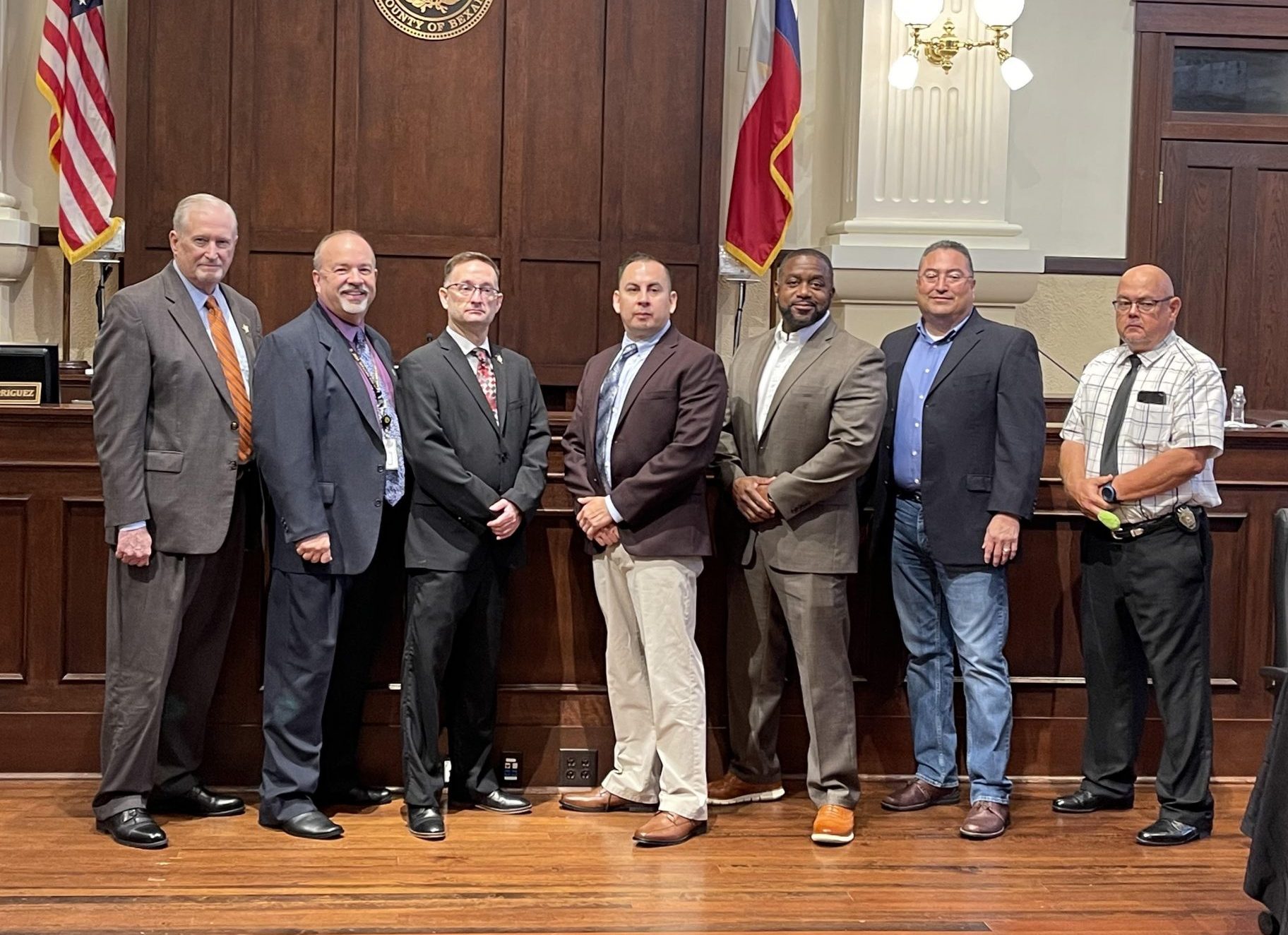
I appreciated the opportunity to be the chief negotiator for the Deputy Sheriff’s Association of Bexar County (DSABC) which represents 1,400 deputies and detention officers. Negotiations with the County and Sheriff have always been difficult and that proved true in these negotiations. The union and county met for the first time on June 24, 2020. The contract expired on September 30, 2020 but had a two-year evergreen clause set to expire on September 30, 2022. The parties had 21 formal bargaining sessions. An agreement was reached in August 2021 but the union members rejected the proposed new contract by a vote of 54-514. The parties returned to the table and concluded a new contract that was ratified by the members by 500-51. The contract will expire on September 30, 2025 and has a two-year evergreen until September 30, 2027.
The only concession was a major one. The County Commissioners Court passed a resolution that they would not sign a new agreement with the union unless the union agreed to remove arbitration for disciplinary terminations and demotions. Other suspension appeals went to the Civil Service Commission. DSABC is one of only a few sheriff’s offices with bargaining rights, and only 1 of 2 with arbitration for discipline. With the contract set to expire in 9 months the union had few options but to craft a better disciplinary appeal than current CSC system. The parties agreed to expand the CSC from three-members (1 each appointed by sheriff, DA and Commissioners) to a seven-member CSC (1 each from sheriff, DA, county judge & 4 commissioners). In a first for Texas police or deputies, the union will appoint one observer to sit on the dais and be in executive session during all appeal hearings. The influence of the sheriff was 1-3 is now 1-7 CSC members.
The big gain was in wages and benefits. All special pays will remain the same. New wages will be 5% upon signing contract plus $2,000 frontline worker pay; 5% on October 1, 2022; 2.5% on October 1, 2023 and 2.5% on October 1, 2024. In each year of the 2.5% the union gained a “me-too” clause that guarantees any COLA to non-sworn county employees that exceeds 2.5% must be given to bargaining unit. Effective 4th year of contract on October 1, 2024 top out base pay for Detention wages will be Captain $107,508; Lieutenant $88,404; Sergeant $74,136; Corporal $61,802; and Detention Officer $54,923. Top out base pay for Law Enforcement are Captain $113,324; Lieutenant $103,416; Sergeant $94,008; Investigator $85,452, and Deputy $73,404.
There we substantive updates to the current contract. A Citizens Action Advisory Board (CAAB) was added to the contract which locks the oversight board into the contract. Deputies cannot be subpoenaed or force to testify. The union can appoint one citizen as a non-voting member who can participate in all hearings.
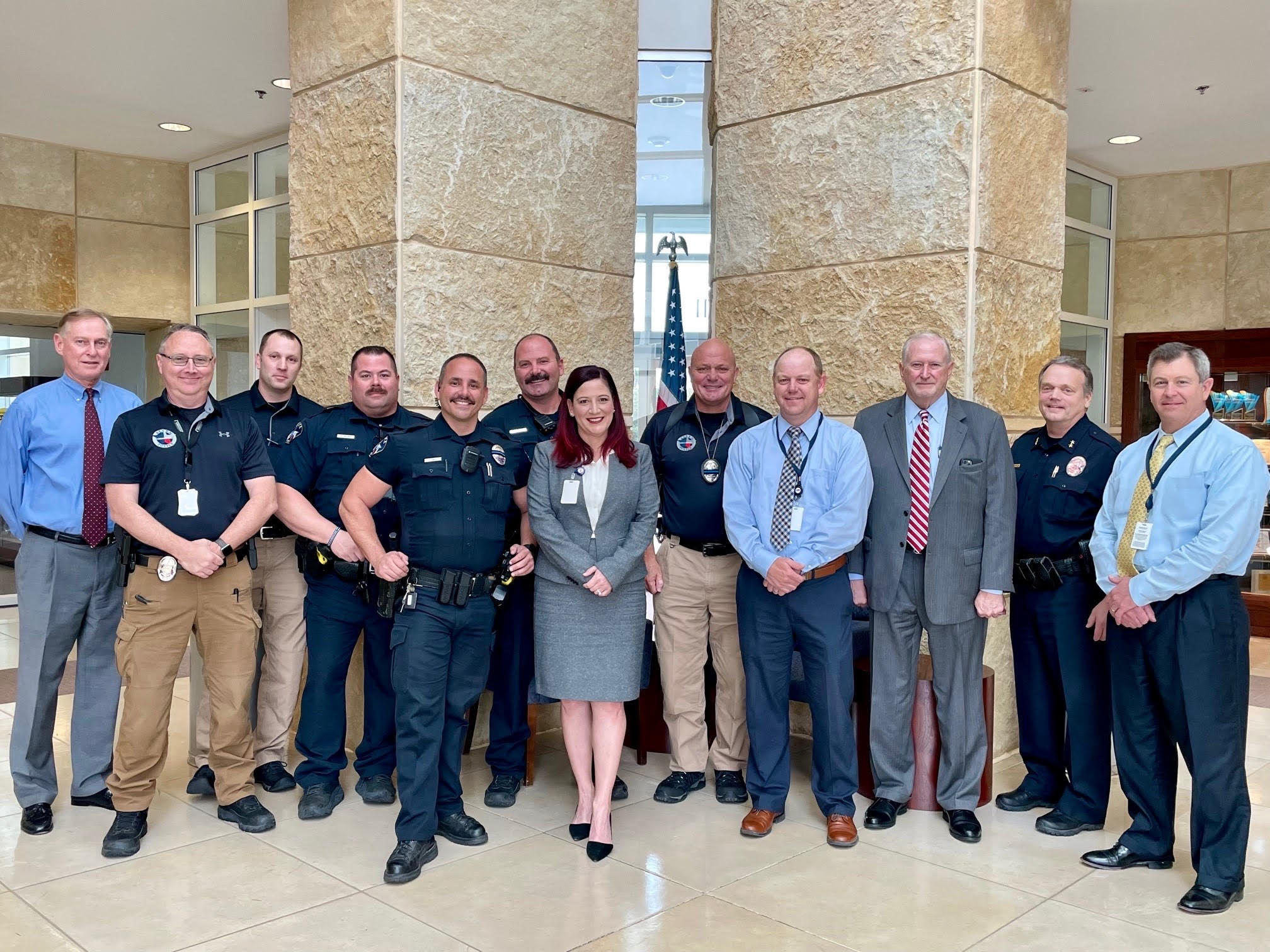
The City of Allen approved meet and confer rights to the Allen Police Association pursuant to TLGC Chapter 142, Subchapter B. The Association and the City negotiated their first Memorandum of Understanding in two formal sessions. APA President Mario Dmytrus and MOU Team Chairman Dillion Egizi led the bargaining team and assisted by Chief Negotiator Ron DeLord. Allen deputy city manager Ben Strong assisted by City Attorney Terrence “Terry” Welch led the city bargaining team. The parties agreed to a MOU from October 1, 2021 to September 30, 2024. The City had a market data compensation plan that compares the base wages of APD officer, corporal, sergeant and lieutenant with the base wages for the same ranks in Addison, Carrollton, Denton, Farmers Branch, Frisco, Garland, Lewisville, McKinney, Mesquite, Plano and Richardson. In the new agreement the City will update its pay plan each step and grade to reflect market plus 2%.
Other benefits included the City commitment to continue certification pay and assignment pay. The City added Shift Differential Pay at $200 month for Patrol B Shift, Patrol C Shift, and Evening Traffic Shift; Educational Pay at Associate ($50); Bachelors ($75); and Masters ($100). Officers will be paid for both certification and education pay. SWAT officers will start receiving $100 per month. Non economic language included Association right to use Bulletin Board, payroll deduction of dues, APA Communications with management.
Chapter 142 (B) requires that 50% of the bargaining unit vote in favor of any agreement. Of the 137 eligible APD officers, the ratification vote was 101-0.
Your content goes here. Edit or remove this text inline or in the module Content settings. You can also style every aspect of this content in the module Design settings and even apply custom CSS to this text in the module Advanced settings.

I was privileged to have been the chief negotiator for the McKinney Police Association, FOP, Lodge 107. The McKinney Police Association negotiated their 4th memorandum of understanding with the City of McKinney. The Association has a market based data pay plan that provides officers with the average percentage wage increases of comparable cities: Allen, Carrollton, Frisco, Garland, Grand Prairie, Irving, Lewisville, Mesquite, Plano and Richardson. In prior agreements the Association and City agreed to provide officers with the average plus 1.5% and evaluate the comparable city wage increases twice a year. The City gathers comparable cities wage percentages in April and those increase go into effect on October 1st. The City gathers the data on January 1st and any adjustments go into effect on February 1st. This market driven plan captures in April all raises received from comparable cities in the prior Oct and the second data adjustment captures all wage increases given comparable cities after current year October raises and officers receive that in February.
The new MOU raises the plus percentage from 1.5% to 1.75% for FY 22-23 and FY 23-24; 2.0% for FY 24-25. The parties have a unique contract extension provision. The contract expires on September 30, 2025 unless the parties mutually agree to not negotiate a new MOU; and if that occurs the plus percentage will be 2.0% in FY 25-26 and increase to 2.5% in FY 26-27. This should make McKinney the number 2 or number 3 highest paid city among comparable cities. One additional benefits as added: all officers will receive $50.00 monthly as a cell phone allowance.

I appreciated the opportunity to again act as the chief union negotiator for the Laredo Police Officers Association. The COVID-19 outbreak started just as the City of Laredo and the Laredo POA commenced contract negotiations in 2020. Due to the uncertainty of the economic impact on city finances, the City refused to make an economic proposal. The parties eventually agreed to a one-year contract that would have expired on September 30, 2021. The tentative agreement included a substantial number of non-economic issues. The members of the union soundly rejected the proposed one-year contract and the contract went into evergreen. Prior to ratification the union changed presidents.
LPOA president Ramiro Paredes, Jr. picked a new negotiating team that developed economic and non-economic proposals. The city’s finances had not been as deeply impacted as were predicted, and the city received federal funds for COVID relief. The City and the LPOA met to restart negotiations on July 1, 2021 and at that meeting they reached a tentative agreement on a new contract that would expire on September 30, 2025. This was perhaps the quickest negotiations for a unit of 500+ officers that I have ever had.
The primary amendments to the contract included:
- FY 2021 will be a $2,200 per officer regardless of rank; FY 2022 will a 2% across-the-board raise; FY 2023 will be a 2.5% across-the-board raise; and FY 2024 will be a 3% across-the-board raise.
- Cadet pay will remain at $55,598. On October 1, 2024 starting pay for an Officer will $66,643 and a topped out Officer at 120 months will be paid $91,353; Investigators will top out at $95,805; Sergeants at $103,251; Lieutenants at $114,275; and Captains at $126,743. Officers to Captains are non-exempt employees and receive overtime pay. Deputy Chiefs and Assistant Chiefs are exempt and their salary is set by the City; however, in this contract they are guaranteed COLA raises and their base is set as of October 1, 2024 for Deputy Chiefs at $155,126 and Assistant Chiefs at $170,602.
- LPD officers receive both TCOLE Certification Pay and Educational Incentive Pay but for decades it has been on a sliding scale where Officers make the least up to Assistant Chiefs making the highest pays. Effective October 1, 2021 all officers will receive the same pays. Certification pay for an Intermediate is $175 per month; Advanced is $225 per month and Master Peace Officer is $300. Education pay is Associate degree at $110 per month; Bachelor’s degree at $220 per month; and Master’s degree at $300 per month.
- The contract provided for 13 paid holidays; however, the city had 17 holidays for non-sworn employees. Now the contract provides for 17 paid holidays.
- The contract provides health insurance for active officers at no cost and officers pay for only 50% of dependent costs. During the first contract negotiations the City demanded substantial reductions in city-provided health insurance; however, the city withdrew those concessionary demands. The city pays 100% of costs for retired officers until age 65 and then pays the cost of Medicare supplemental coverage.
- The contract has a Police Retiree Health Insurance wherein active officers contribute $50 per pay period into a fund that offsets the cost of a retired officer’s dependents if the officer worked at least 20 years at LPD.
- There were no substantive changes to the disciplinary and internal affairs provisions.
- The contract has an evergreen clause until September 30, 2027.

I appreciated the opportunity to address the California Public Safety Partnership at Irvine. Change is the only constant and police unions need to embrace the reforms that improve our profession.
Florida PBA interviews Ron DeLord about police reform movement
The Former Mesquite Cop Behind the Power of the Dallas Police Union
San Antonio police union contract talks become heated
Officer discipline takes center stage as city and San Antonio police union start contract talks
Day 1 of San Antonio, police union talks ‘not as antagonistic’ as last time
Ballot initiative to gut San Antonio police union draws opposition from AFL-CIO
Ron is quoted in this article
https://www.texasmonthly.com/articles/a-bad-cops-best-friend/
Sheriffs’ Association of Texas Writer’s Corner

Your content goes here. Edit or remove this text inline or in the module Content settings. You can also style every aspect of this content in the module Design settings and even apply custom CSS to this text in the module Advanced settings.

Top Row – VP Lloyd Cook, Treasurer Pat Blausner, 3rd VP Anthony White & Senior City Attorney Christopher Troutt
Bottom row – Deputy City Manager Jesus Chapa, President Manny Ramirez, Mayor Betsy Price & City Manager David Cook
Fort Worth POA And City of Fort Worth Ratify new 4-Year Contract.
Fort Worth POA and City ratified a new 4-year contract that will expire in 2024. The parties started negotiations in 2019 and after about a year reached a mutual agreement. The total compensation packet was $68 million ATB & Leave Sellback) averaging about 12.5% over four years. By 2021 FWPD will be the highest paid agency in Texas. The parties agreed to modernizing the disciplinary and internal affairs language. The city agreed to increase sick leave sellback from 720 hours to 1,000 hours. Military leave was increased from 120 hours to 150 hours annually. In light of the “Defund” the police movement, the City of Fort Worth invested in its police officers to provide for the highest quality officers and candidates. I appreciated the opportunity to be the chief negotiator of FWPOA.
Ron DeLord interviewed by Texas Monthly on police reforms – After the Protests: Four Perspectives on the State’s Criminal Justice System – Texas Monthly
Ron is mentioned in this article – Former San Antonio City Manager To Release Book About Police Union Fight | Texas Public Radio
Interview with Ron – Is It Time To Rethink Policing In America? | Texas Public Radio
Ron is quoted in this article – Houston reform advocates: We want a seat at the police contract bargaining table – HoustonChronicle.com
Ron is quoted in this article – Reform vs. Rebuild: Defunding Law Enforcement in Texas
Ron is quoted in this article – Power to Rework Criticized Police Contracts Lies With Elected Leaders – Route Fifty
I heard this story on NPR One and I thought you would find it interesting. Check it out.
George Floyd Death: Minneapolis Police Union Blocked Reform
Click the link to hear the Interview With Attorney and Author Ron DeLord – Labor Relations Information System
2019

Dallas Fire Lieutenant Charlie Abney served as the chair of the Police and Fire employee Groups
The City of Dallas is covered by a meet and confer state law unique to the city. Dallas has not adopted the state civil service law and instead has a charter civil service system. All police officers in the rank of lieutenant and below and all fire fighters in the rank of battalion chief and below are in one bargaining unit. That is strange enough but then the City recognizes three police and three fire fighter employee groups as the exclusive bargaining agent – Dallas Firefighters Association Local 58, Dallas Black Firefighters Association, Dallas Hispanic Firefighters Association, Dallas Police Association, Black Police Officers Association of Dallas and the National Latino Law Enforcement Organization of Dallas. The six employee groups have equal standing on the team regardless of membership or dual membership. The City has refused to negotiate over a grievance procedure to settle contract disputes, and the City has refused to negotiate over discipline or promotions deferring to charter civil service. The City also had a merit based pay plan and pay parity between police and fire. I had the privilege to be the chief negotiator for the Employee Groups for the last 3-year contract.
I was retained in January to be the chief negotiator for this round of contracts talks. After nine months the City and the six employee groups reached an agreement on a new 3-year contract to expire in 2022. The 5,000 police officers and fire fighters ratified the contract with a vote of 2,112 to 23. The new contract changes the merit pay step system to a seniority tenure based step pay plan. The pay each year is now determined by a market-based pay comparing 17 cities (Fort Worth, San Antonio, Houston, Arlington and Austin plus 12 Dallas suburbs. To get Dallas police and fire to the market average: 67% of officers will receive up to a 10% pay increase in year one; 20% of officers will receive up to 11% to 20% pay increase; and 13% of officers will receive over 20% pay increase. The new pay plan in year one is:
- Police Officer/Fire Fighter has 9 steps starting at $61,367 to top out $81,983
- Police Senior Corporal/Fire Driver has 4 steps from $79,387 to you out $89,350
- Police Sergeant/Fire Lieutenant has 3 steps from $91,584 to top out $98,626
- Police Lieutenant/Fire Captain has 3 steps from $101,092 to top out $108,865
- Fire Battalion Chief has 3 steps from $111,586 to top out $120,166

Lilia Castro, Corpus Christi Assistant City Attorney, & Scott Leeton, CCPOA President
I appreciated the opportunity to be the chief negotiator for the Corpus Christi Police Officers Association. The City and CCPOA reached a new 4-year agreement that will expire in 2023 and has a 4-year evergreen clause that will extend the contract until 2028 in the event of an impasse. The CCPOA team was led by President Scott Leeton and the City team by assistant city attorney Lilia Castro. Officers ratified the new agreement by a vote of 95% to 5%. A summary of new language includes:
- Wage increases of 1%, 2%, 2% and 2%
- Longevity pay for years of service up to 25 years increased to $15 per year of service (old maximum was $1,440 was increased to a maximum pay of $4,500 per year)
- Added new Certification monthly pay of Intermediate at $75, Advanced at $100 and Masters at $150 (paid in addition to education incentive)
- Health Insurance changed current premium paid PPO and CDHP to a mandatory CDHP with city paying $1,600 in Health Savings Account and NO premiums for officer or family (deductible $3,000/$6,000 family)
- Increased incentives for Bomb, SWAT, HNT, Dive and FTO
- All unused sick leave can be donated to sick leave pool
- Special Overtime rate on holidays

I had the pleasure of being the chief negotiator for the Nueces County Sheriff’s Officers Association representing nearly 300 deputy sheriffs, detention officers and deputy constables. The County came to the table recognizing that the wages of these men and women were substandard and the sheriff’s office and 5 constable’s offices were unable to attract and retain officers. NCSOA President Jose Gonzalez and his bargaining team did an excellent job of having comparable studies indicating that Nueces County was 15th in the state in population but 30th among 30 of state’s largest counties in starting salaries. The County and Association agreed up a 4-year contract with non-supervisors receiving a 19.2% wage increase and supervisors receiving a 16% wage increase. The Association negotiated new due process rights during IAD investigation, counting vacation leave as productive time for overtime, increased Association Business Leave, and increased certification pay for deputy sheriffs and deputy constables. The membership vote had only 2 against votes. The County Judge and 4 commissioners voted 5-0 to ratify the new contract.
Web page quoting Ron – Beto bitter over El Paso police-union fight: Here’s why that’s okay
2018

I was privileged to have been asked to speak at the 66th annual conference of the Peace Officers Research Association of California (PORAC) at Reno. My topic included the paradigm shifts impacting officers and unions. The challenges today are immense and change is happening at warp speed. Activists are targeting police union contracts and using the political system to pass more stringent police reforms.

(Seated) Austin Police Association President Ken Casaday and City Manager Spencer Cronk sign new contract. (L to R standing) APA Vice President Thomas Villarreal, APA Chief Negotiator Ron DeLord, APA Bargaining Chair Chris Perkins, City Labor Relations Director Deven Desari, APD Chief Brian Manley and APD Assistant Chief Troy Gay
It was a long and rocky road to get a new 4-year contract between the Austin Police Association and the City of Austin. After a year of negotiations, the APA and the City reached a tentative agreement on a new 5-year contract. APA members ratified the contract by a vote of 85%-15%. On December 13, 2017 the tentative agreement went before the Austin City Council. After nine hours of community activists attacking the contract for being too expensive and lacking meaningful changes to police oversight, the Mayor and Council refused to ratify.
Although the Mayor and council offered some lump sum money to extend the agreement for one year, the APA refused to agree and requested that the parties start with new negotiations. The department returned to state civil service law (Chapter 143) and it had consequences for city and officers. The city council refused to reinstate some of the stipends causing some officers to have their pay reduced by $500-$1,000 per month. After stop and go negotiations during 2018 the parties finally reached a new agreement on a 4-year contract. The new contract returned all stipends and gave raises of 1%-2%-2%-2% during the life of the contract. The city had conducted a year long public review of police oversight and the parties agreed on the recommendations of the city manager. APA members ratified the contract by 79%-21%. On November 15, 2018 the Austin City Council ratified the new contract by a vote of 11-0. The community activist groups spoke in favor of the contract.

Lieutenant Brian Moriguchi, President Los Angeles County Professional Peace Officers Association, myself, Wayne Quint, Executive Director (retired Orange Co DSA) and Art Reddy, PPOA board (retired LASO & retired IUPA VP). Enjoyed addressing their board retreat today.
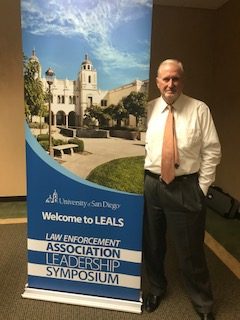
I was privileged with being a presenter at the annual Law Enforcement Association Leadership Symposium at the University of San Diego on September 19, 2018. My topic was Police Unions and Police Reform: Searching for the Truth.

My topic this year at the Police Union Executive Leadership Conference at Cambridge, MA was on police unions and police reform. One hundred police union leaders from the US, Canada and Australia attended and all of them have varying challenges ahead as they face calls for police reform. The topic is complex and somewhat out of the control of police unions. My message was simply embrace reform that includes real transparency, accountability and that will gain trust from the community all the while maintaining due process for officers. The media and social media create a false narrative at times and elected officials overreact and make the incident political. There is a path to reform where all stakeholders can have buy-in.


Ron was interviewed on a Podcast “Grits for Breakfast” with interviewer Scott Henson.
He is an Austin activist who had advocated against the ratification of the Austin police contract I negotiated.
2017

It was an honor and a privilege to be invited to represent Texas and US law enforcement at the 8th annual Wall to Wall motorcycle ride to raise funds for the Police Legacy. Police officers from every state and territory ride motorcycles from their local police memorial wall to the National Police Memorial at Canberra. Thanks to Mark Burgess, Executive Director of the Police Federation of Australia, NSW Police Sergeant Paul Bousfield who oversees the Police Legacy, and NSW Assistant Police Commissioner Michael Corboy.
KXAN.com August 8, 2017 Groups look to APD contract negotiations for improved police transparency
Your content goes here. Edit or remove this text inline or in the module Content settings. You can also style every aspect of this content in the module Design settings and even apply custom CSS to this text in the module Advanced settings.

After 18 months of bargaining the City of Fort Worth and the Fort Worth POA reached an agreement on a new 4-year contract. The current contract expired on September 30, 2016 and the parties continued to negotiate during the one year evergreen period. The new contract will expire on September 30, 2020. FWPOA President Rick Van Houten and myself as chief negotiator lead the association team and Assistant City Manager Valerie Washington and San Antonio management attorney lead the city team. The membership ratified with contract with a 92% vote and the City Council vote was unanimous.
The highlights are effective June 1, 2017 a one time signing bonus of $1,182.39 per officer regardless of rank and a 2.2% across the board wage increase; effective October 1, 2017 a 2% across the board wage increase; effective October 1, 2018 a 3.1% across the board wage increase; and October 1, 2019 a 3.1% across the board wage increase. In previous contracts officer could be paid for Certificate Pay or Education pay, at the highest pay but not both. The maximum pay was $1,400 pr year. In the new contract pay for certificate and education were increased and an officer can get the highest pay in each category for a maximum pay of $6,480. Each officer who completes and passes an annual physical fitness exam will receive $1,000.
Substantial changes were made to the Modified Hiring language to allow FWPD to recruit and pay officers with prior experience to join their department. New protections for officers under investigation and due process rights were added. Chief Joel Fitzpatrick currently has 10 appointed positions for Assistant and Deputy Chiefs, and now the chief can appoint up to six commanders. All appointed positions are from FWPD and the city agreed to not reduce the number of officers in lower ranks to make the appointments.

I had the opportunity to act as the Chief Negotiator for the second time for the McKinney Police Association which has about 225 officers in the bargaining unit. In 2015 the Association and the City settled on a two-year that would expire on September 30, 2017. The parties wanted a longer term agreement this round and were able to mutually agree on a new 4-year contract. Due to the competitive police labor market in the DFW area, the City had been paying 50% of the median of seven suburban departments that are some of the highest paid in the state. In the 2015-2016 contract the City agreed to pay 50% plus 1.5% using market data in April and paying the new raises on October 1st. This formula still left MPD below market if comparable agencies received greater than 1.5% on October 1st. The new contract provides for a second market study in January and paid in February so that MPD receives a true 50% market median. The parties also agreed to lessen the time needed to declare one’s retirement and receive a maximum sick leave accrual payout; officers will receive a new personal day; the grievance procedure was simplified; officers will contribute one hour of vacation leave to a new Association Business Leave Pool for use by MPA officials; and a new force reduction and reinstatement clause in the event of rank reductions or layoffs. Ninety-nine percent of the members voting approved the new contract.

I was privileged to be a panelist at the Murphy Institute of CUNY conference “Confronting the Tragedy: Law Enforcement, Unionism and Communities of Color.” The moderator was Professor Kafui Attoh (The Murphy Institute), Derek Willingham (Labor Relations Specialist at AFGE), Rebecca Neusteter (Director of Policing at Vera Institute of Justice) and Tim Robbins (Journalist & professor at CUNY).

Randle Meadows (retired Arlington PD), director of community outreach for Murphy Nasica, and I speaking at the Police Union Executive Leadership conference at Harvard Law School on future trends in policing. The 19th annual conference brings together the largest police unions in the US and Canada.

The Upstate New York PBA held its annual conference at the Seneca Resort and Casino at Niagara Falls, NY on April 10-11, 2017. I was invited to speak to the delegates about future trends in policing and what police unions need to be doing to survive the changes ahead.
Washington City Paper (January 10, 2017)
Chaos Reigns Within D.C.’s Police Union

Chief negotiator for the unions Ron DeLord and Dallas City Manager A.C. Gonzalez
Chief negotiator for the unions Ron DeLord and Dallas City Manager A.C. Gonzalez after the Dallas Meet and Confer Team and the City reached a tentative agreement on a new 3-year contract. The bargaining unit covers 5,000 police and fire who are represented by 4 police groups and 3 fire groups. The employees will receive a 25% raise if they still have steps left and 6% if topped out plus increases to certificate pay. The bargaining unit and city ratified the agreement.

SAPOA Vice President Dean Fischer, SAPOA President Mike Helle and Chief Negotiator Ron DeLord Back to camera – Jeff Londa, chief negotiator for City of San Antonio
Contract negotiations for San Antonio police were difficult and confrontational, but in the end the parties reached a new 5-year contract after 2-1/2 years. I was hired as the chief negotiator for the police association shortly after negotiations started in February 2014. The city had hired three outside management lawyers who came to play hardball. Negotiations went back-and-forth with no progress. SAPOA hired a media & political consultant to get its message out to the public and elected officials. During negotiations the mayor resigned to take a position in the Obama administration. The appointed mayor defeated a sitting state senator for mayor in a hotly contested municipal election. The Chamber of Commerce and various media outlets bombarded the police for not taking the city’s concessionary proposals. The city’s main bone of contention was that officers did not pay a premium for their dependents. The city’s legal team sued after the police and fire contracts went into evergreen contending the 10-year evergreen was unconstitutional, but the police and fire associations won in state district court. The city appealed. The judge ordered mediation between SAPOA and the City. The parties reach a settlement agreement which was taken to a vote of the officers. A new contract was ratified by 72%-29%. The city council ratified the contract shortly thereafter.
The officers did not receive any wage increase but retained premium free dependent health insurance for budgets commencing October 1, 2014 and October 1, 2015. The five-year contract provided for a 3% lump sum bonus effective October 1, 2016; 3% effective October 1, 2017; 3% effective October 1, 2018; 3% effective October 1, 2019; 2% effective October 1, 2020 and 3% effective April 1, 2021. The new health insurance will have the option of a no cost high deductible consumer driven health plan and a city contribution of $1,500 to an officer’s health savings account. Officer may chose a PPO health plan with low cost premiums for dependents. Officers can switch between the plans each year.

Corpus Christi deputy city manager and Corpus Christi POA President Scott Leeton
Corpus Christi deputy city manager and Corpus Christi POA President Scott Leeton shake hands on a proposed new four year contract. Ron DeLord served as the chief negotiator for the Association.

Laredo POA
I was honored to act as the chief negotiator for the Laredo Police Officers Association. After months of negotiations officers voted to ratify a new 4-year contract. The officers will receive a 3% raise October 1, 2016; 4% raise October 1, 2017; 2.5% raise October 1, 2018 and 2.5% raise October 1, 2019. LPD officers have one the best retiree health plans in the state. The city provides all officers health insurance at no costs while the officers are active and into retirement, including medicare supplement. Officers pay 50% of the costs for their dependents. Officers who work 20 years at LPD can purchase dependent health insurance and receive a subsidy from the Police Retiree Dependent Fund that on average covers 70% or more of the costs. The PRDF is funded by officers paying $25 per pay period during their careers. In the new contract officers will increase their contributions to the PRDF to $37.00 per pay period and add fifty cents each additional year. The bargaining unit covers about 480 officers.

Blake Birdwell, Austin Payne, Ron DeLord (Chief Negotiator), Joseph Crawford, Stefan Wilson and Brad Moore (President)
The Cedar Park Professional Firefighters Association voted 39-9 to ratify a new one-year memorandum of understanding with the City of Cedar Park. The agreement provides for a 1.75% across-the-board increase. Firefighters will also get step increases. The one-year extension came about because the City refused to agree to any of the Association’s substantive proposals. As such the Association refused to agree to any City proposals. The parties will resume negotiations on a new contract in March 2016.
